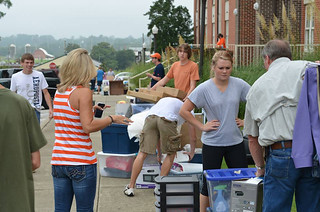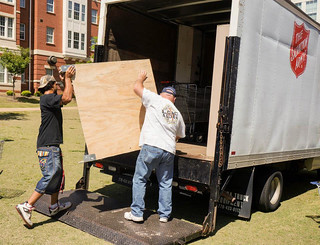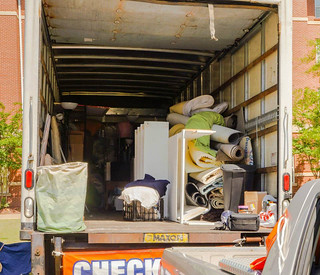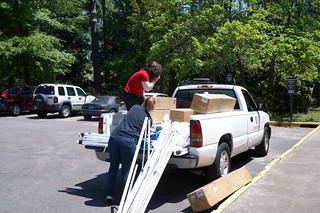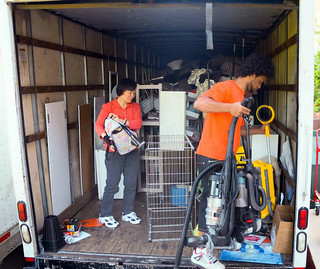Check-Out for Charity has another successful year benefitting the less fortunate in the Auburn community
Article body
Auburn University students donated 2,232 pounds of food and 1,055 cubic yards of household items during the 22nd annual Check-Out for Charity, held by Auburn University's Auxiliary Enterprises Property Management.
The household items consisted of everything from clothing and bedding to appliances, furniture and carpet, all of which were distributed to the Habitat for Humanity ReStore and the Salvation Army of Lee County. The food was donated to the Food Bank of East Alabama, a longtime partner with the Check-Out for Charity Campaign.
Students donated the items as they moved out of the residence halls at the end of the spring semester, but the process of collecting all of these items continues well after the residents move out. The items that are left behind are tagged and stored for 60 days and if not claimed, the items are donated to the charities.
David Maddox, director of Auburn University's Auxiliary Enterprises Property Management, started this program 22 years ago after he observed the vast amount of usable items that were being placed in the landfill. Maddox has a passion for helping the people in Auburn's community.
"The program caught on early and has grown over the years, with much of the growth directly related to the increase in the number of students housed on campus and corresponding to an increasing student interest in sustainability. I enjoy and appreciate the fact that so many students are willing to voluntarily donate the items to our charity partners with the end result being a great benefit to people in our community who are less fortunate than many of us," he said.
Amy Mosley, coordinator of the program, has played a major role in making Check-Out for Charity successful over the last five years. This year, Mosley worked 10 or more hours a day with the help of Student Housing employees. Together this team filled two 26-foot box trucks, two 15-foot box trucks and several pickup trucks. The charity partners provided their own trucks and staff that made numerous trips to their stores on a daily basis. Mosley appreciates the help from the charity partners and is grateful for the work they do around the community.
"All of these partners have an array of social services that are diverse in serving the community. The Salvation Army provides multiple social services, such as Meals on Wheels to disaster relief, and so on. The Food Bank provides food to families who are in need and the ReStore who is connected with Habitat for Humanity that builds homes for families," she said.
Each year, the Check-Out for Charity Campaign becomes even more successful. Residents are aware of the donation locations set up around Auburn's campus and they truly make an effort to donate to a great cause. Mosley described how rewarding it is to see the Auburn Family come together and make these donations.
"It is rewarding to know that the residents have an awareness of how beneficial their donations are to the community. All three of the community service programs serve the Lee County area in multiple ways and it amazing to know the Auburn University family contributed," she said.
Brandon Dixon, operations manager for the Habitat for Humanity ReStore, expressed his appreciation of the university for allowing them to collect.
"Thanks to the Check-Out for Charity event, our ReStore has received three months' worth of donations in six days," he said.
For more information, visit the Check-Out for Charity Facebook page.
Related Media
Related Links
Media interested in this story can contact Communications Director Preston Sparks at (334) 844-9999 or preston.sparks@auburn.edu.
Auburn University is a nationally ranked land grant institution recognized for its commitment to world-class scholarship, interdisciplinary research with an elite, top-tier Carnegie R1 classification, life-changing outreach with Carnegie’s Community Engagement designation and an undergraduate education experience second to none. Auburn is home to more than 30,000 students, and its faculty and research partners collaborate to develop and deliver meaningful scholarship, science and technology-based advancements that meet pressing regional, national and global needs. Auburn’s commitment to active student engagement, professional success and public/private partnership drives a growing reputation for outreach and extension that delivers broad economic, health and societal impact.



